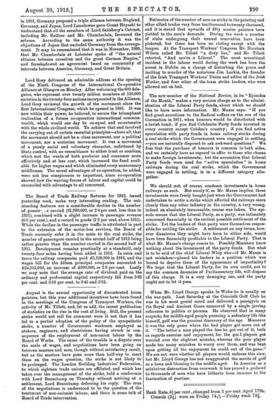The Board of Trade Railway Returns for 1912, issued yesterday
week, make very interesting reading. The out- standing features are a considerable decline in the number of passeni a carried (31,980,000, or 2.4 per cent. less than in 1911), combined with a slight increase in passenger revenue (0.6 per cent.), and a record in goods (1.2 per cent. above 1911). While the decline in the passenger traffic is attributed in part to the extension of the motor-bus services, the Board of Trade correctly refer it in the main to the coal strike, the number of passengers carried in the second half of 1912 being rather greater than the number carried in the second half of 1911. Development remains practically at a standstill, only twenty-four miles having been added in 1912. In rates and taxes the railway companies paid £5,129,800 in 1912, and the wages bill for the fifteen principal companies amounted to £24,313,000, an increase of £890,000, or 3 8 per cent. Lastly we may note that the average rate of dividend paid on the ordinary and preferential capital respectively fell from 3.62 per cent. and 3'56 per cent. to 3.45 and 3-52.


































 Previous page
Previous page